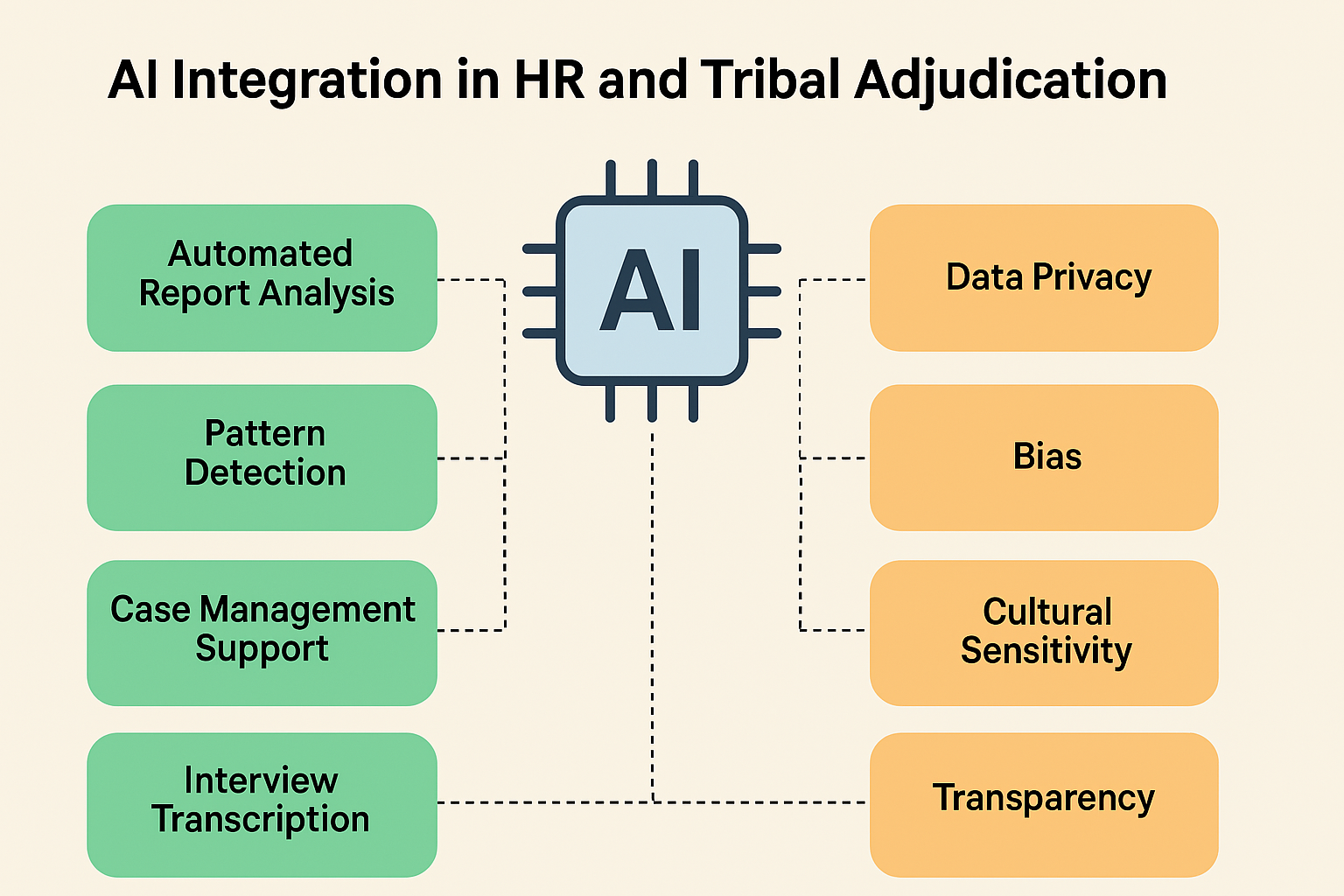Table of Contents
Introduction
The integration of Artificial Intelligence (AI) into tribal adjudication and human resources (HR) investigations offers significant benefits, including increased efficiency and consistency. However, it also raises critical concerns regarding the protection of confidential information, sensitive data, and Personally Identifiable Information (PII). This blog explores empirical findings on the use of AI in these contexts and outlines strategies to safeguard data privacy and uphold tribal sovereignty.
The Promise and Perils of AI in HR and Tribal Adjudication
A 2024 survey by the Society for Human Resource Management (SHRM) revealed that nearly half of HR professionals have prioritized AI integration in the past year, particularly for tasks like case summarization and reporting . While AI tools enhance efficiency, they also pose risks related to data privacy and potential biases.
In tribal contexts, the adoption of AI must be approached with caution. Experts at the University of Oklahoma’s “AI, Data Sovereignty, and Tribal Issues” forum emphasized the importance of establishing clear policies to retain data sovereignty and protect cultural heritage .
Empirical Insights into AI’s Impact
1. Bias in AI Systems
Recent studies have highlighted the presence of biases in AI systems used for HR functions. For instance, a 2025 study found that AI-enabled recruitment tools can inadvertently perpetuate gender and racial biases, affecting hiring decisions .
2. Data Privacy Concerns
A report by the OECD in 2024 discussed the challenges of aligning AI systems with data governance and privacy standards. The report emphasized the need for international cooperation to develop AI systems that respect and support privacy .
3. Trust and Organizational Commitment
A study published in Nature in 2024 examined the role of trust in the adoption of generative AI tools within HR practices. The findings indicated that trust significantly impacts organizational commitment and employee engagement .
Strategies for Protecting Confidential Information
To harness the benefits of AI while safeguarding sensitive data, organizations should consider the following strategies:
1. Implement AI-Powered Redaction Tools
Utilize AI tools capable of identifying and redacting PII and sensitive information from documents. For example, Reveal’s Blackout software automates the redaction process, reducing human error and enhancing efficiency .
2. Establish Robust Data Governance Policies
Develop clear policies that define data ownership, access controls, and sharing protocols. In tribal settings, these policies should align with the principles of tribal sovereignty and cultural preservation.
3. Conduct Regular Bias Audits
Regularly audit AI systems to detect and mitigate biases. This involves testing AI tools for discriminatory patterns and adjusting algorithms to ensure fairness and equity.
4. Provide Comprehensive Training
Educate staff on the ethical use of AI, data privacy laws, and the importance of maintaining confidentiality. Training should be tailored to the specific cultural and legal contexts of the organization.

Figure 1: Overview of AI applications in HR and tribal adjudication, highlighting areas of benefit and concern.
Conclusion
The integration of AI into HR investigations and tribal adjudication processes offers opportunities for improved efficiency and decision-making. However, it is imperative to address the associated risks to data privacy and cultural integrity. By implementing robust data governance policies, utilizing AI responsibly, and fostering a culture of trust and transparency, organizations can navigate the complexities of AI adoption while upholding the highest standards of confidentiality and respect for tribal sovereignty.
References
- SHRM. (2024). HR Adopts AI. Retrieved from https://www.shrm.org/topics-tools/news/all-things-work/ai-hr-challenges-opportunities
- Native News Online. (2025). Experts Examine AI’s Influence on Tribal Data at OU Technology and Sovereignty Forum. Retrieved from https://www.nativenewsonline.net/education/experts-examine-ai-s-influence-on-tribal-data-at-ou-technology-and-sovereignty-forum
- Decker, R. (2024). June 2024 EN:Insights Forum: Investigating AI in the Workplace. SHRM. Retrieved from https://www.shrm.org/in/executive-network/insights/june-2024-en-insights-forum–investigating-ai-in-the-workplace
- OECD. (2024). AI, Data Governance and Privacy: Synergies and Areas of International Co-operation. Retrieved from https://www.oecd.org/content/dam/oecd/en/publications/reports/2024/06/ai-data-governance-and-privacy_2ac13a42/2476b1a4-en.pdf
- Nature. (2024). Generative AI as a Catalyst for HRM Practices: Mediating Effects of Trust. Retrieved from https://www.nature.com/articles/s41599-024-03842-4




